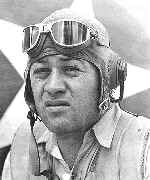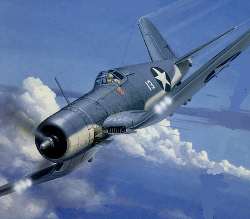
Major Greg Boyington
A real Marine hero


Major Gregory Boyington
United States Marine Reserve
In 1941, just prior to the entry of the US into World War II, Boyington's career in the Marines was faltering due to a number of drunken brawls. Eager for a change, he responded to Claire L. Chennault's recruitment of American fighter pilots to join the Flying Tigers,his group of mercenary pilots flying for the Chinese Air Force. Quickly rising to squadron leader, he had accumulated 6 kills against Japanese aircraftby the time the Flying Tigers were disbanded in July 1942.
Overcoming some red tape to get his Marine Corps commission reinstated, he was assigned to the Solomon Islands. At the time, there was a sufficient pool of replacement pilots and aircraft available in theater awaiting assignment that were not needed in already established fighter squadrons, so Boyington persuaded his superiors to let him form them into another squadron. Not having gone through the routine of forming and training as a unit within the US, they unofficially called themselves Boyington's Bastards and then adopted the official squadron nickname of the Black Sheep.
Boyington, at 31 a decade older than most of his men, became forever known as "Pappy". Quickly becoming operational, under Boyington's leadership the Black Sheep scored 97 confirmed kills, 35 probable kills, damaged 50 enemy aircraft and destroyed 21 on the ground during their 84-day first combat tour. Boyington scored 22 kills during this period (the number 26 in the citation being a slight error) to add to the 6 he scored as a Flying Tiger for a total of 28. (Captain Joseph J. Foss, another Marine fighter squadron commander and Medal of Honor recipient, had previously scored 26, all with the Marines, so either man could arguably claim the title of top Marine Corps ace.)
Near the end of the tour, Boyington himself was shot down over the Pacific,then strafed and wounded by Japanese fighters as he floated in his liferaft before being captured by a Japanese submarine. Never reported by the Japanese to be a Prisoner of War, he was presumed dead and hisMedal of Honor awarded "posthumously". He reported in his autobiography Baa Baa Black Sheep that he never recovered emotionally from the 20 months of torture he received from the Japanese, or his learning of his own "death" upon his repatriation after the war. He was medically retired as a Colonel and had several marriages and divorces, alcohol problems and a nearly fatal case of emphysema over the next decades, the successful sale of Baa Baa Black Sheep in the 1950s being one of the few high points.